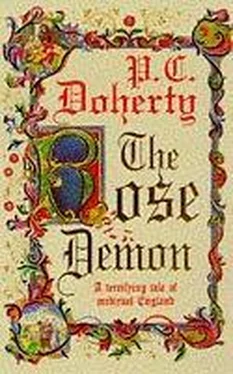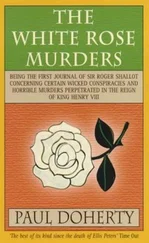Paul Doherty - The Rose Demon
Здесь есть возможность читать онлайн «Paul Doherty - The Rose Demon» весь текст электронной книги совершенно бесплатно (целиком полную версию без сокращений). В некоторых случаях можно слушать аудио, скачать через торрент в формате fb2 и присутствует краткое содержание. Жанр: Исторический детектив, на английском языке. Описание произведения, (предисловие) а так же отзывы посетителей доступны на портале библиотеки ЛибКат.
- Название:The Rose Demon
- Автор:
- Жанр:
- Год:неизвестен
- ISBN:нет данных
- Рейтинг книги:5 / 5. Голосов: 1
-
Избранное:Добавить в избранное
- Отзывы:
-
Ваша оценка:
- 100
- 1
- 2
- 3
- 4
- 5
The Rose Demon: краткое содержание, описание и аннотация
Предлагаем к чтению аннотацию, описание, краткое содержание или предисловие (зависит от того, что написал сам автор книги «The Rose Demon»). Если вы не нашли необходимую информацию о книге — напишите в комментариях, мы постараемся отыскать её.
The Rose Demon — читать онлайн бесплатно полную книгу (весь текст) целиком
Ниже представлен текст книги, разбитый по страницам. Система сохранения места последней прочитанной страницы, позволяет с удобством читать онлайн бесплатно книгу «The Rose Demon», без необходимости каждый раз заново искать на чём Вы остановились. Поставьте закладку, и сможете в любой момент перейти на страницу, на которой закончили чтение.
Интервал:
Закладка:
The Yorkist archers, now emboldened, were running forward, taking up a closer position; behind them, the massed ranks of Edward of York’s cavalry and men-at-arms, their banners flapping, blue, gold and red; the black lion of Hastings, the white lion of Howard. Wenlock still dithered. A roar came from the right, Sir Raymond stared in disbelief. Somerset’s lines were crumbling. Throwing down their arms, the men were running back up the hill behind them. A messenger came riding through, an archer covered in dust and sweat, eyes red-rimmed and staring, voice nothing more than a creak. He flung his arm towards the disintegrating ranks on their right.
‘The Duke of Somerset,’ he gasped, ‘is in retreat! He did not encircle the enemy but ran straight into Richard of Gloucester. Look, his banners can be seen!’
Wenlock’s commanders, lifting their helms, looked to their right. Somerset’s men were fleeing the field and, in the distance, they could see the huge war banners bearing Richard of Gloucester’s insignia, a white boar rampant. Sir Raymond grasped Wenlock’s arm.
‘Stand!’ he shouted. ‘Stand if not charge!’
As if in answer, Raymond heard a fanfare of trumpets from the front. He turned his head and knew the battle was lost. Edward of York had ordered a general advance and a wall of Yorkist steel, solid and impenetrable, was coming in an armed mass towards them. Wenlock turned and fled, the others, including Sir Raymond, followed suit. Behind them they heard the screams and yells, the shimmering clash of sword and armour as the Yorkists met what was left of the Lancastrian front line. At the top of the hill Wenlock reined in, took his helmet off, mopping his face with his hands. He stared around.
‘The Prince!’ he cried. ‘In God’s name, the Prince!’
‘He did not retreat,’ a voice called.
Sir Raymond and others were about to ride down, when pounding along the brim of the hill, their banners held high, came Beaufort and others. The Duke’s rage was terrible. He had lost his helmet, his hair was matted with blood, which ran in rivulets through the dust which masked his face. He did not bother to rein in; his horse crashed amongst them and Beaufort, bringing his axe back, smashed Wenlock’s head, turning it into a bloody pulp. He then lifted his boot and kicked his erstwhile commander’s corpse from the saddle. Beaufort, his eyes mad with fury, glared at the other commanders.
‘So die all traitors!’ he screamed. ‘Wenlock has lost us the battle!’
A shout went up from the melee at the foot of the hill: ‘The Prince is down! The Prince is down!’
Raymond stared back. The dust of battle cleared momentarily in a puff of wind. The gold leopards rampant of Prince Edward’s banner had disappeared. The pennants of York were now clear and the remnants of the Lancastrian army were breaking.
‘We must flee!’ Beaufort shouted. ‘Seek sanctuary in the abbey!’
The Hospitaller, however, just stared open-mouthed towards the battle line. Someone was walking towards him, tall, erect, steel-grey hair cropped, face burnt swarthy by the sun. The man, unnoticed by the men dying and struggling around him, was moving slowly, arms raised in friendship. In one hand he carried a white rose, in the other a red.
‘Otto,’ Sir Raymond whispered. ‘My brother? My brother, what are you. .?’
He felt his arm shaken. One of Beaufort’s squires was staring beseechingly at him.
‘Sir Raymond, we have to flee!’
The Hospitaller looked back. His mind was playing tricks. The vision had vanished: all he could see was a line of men hurrying towards him. Grasping the reins of his horse, he dug his spurs in and followed the rest, galloping across the meadow towards Tewkesbury.
Matthias had woken just before dawn: the house was quiet, his mother and father still sleeping. He dressed hurriedly and, remembering the attack the night before, put on a belt which carried a small sheath knife. He stole down to the kitchen where he ate some bread and salted bacon, and gulped at a cup of watered ale. He stood listening: nothing, except the birds chirping under the eaves. He went across and pulled back the shutter. The day looked set to become a beautiful one. Matthias bit his lip. He felt guilty. He really should wait for his parents but permission had been given, and sometimes adults could change their minds. He stared across at the crucifix, finished the rest of the ale and, still feeling guilty, went across and knelt down, staring up at the face of the crucified Christ. He would, at least, say his prayers.
‘Remember this, my soul, and remember it well. The Lord thy God is One and He is holy. And thou shalt love the Lord thy God with all thy mind, with all thy heart and all thy strength.’
Matthias paused as he heard the floorboards creak above him and, grabbing his small leather bag in which he had placed some bread and fruit, he rushed down the passageway and out of the front door. He slipped over the cemetery wall and ran through the long grass, relishing the wet dew, which splashed his hands, and the morning breeze, which cooled his brow.
Within a short while he was in the village. The high street was empty. A dog ran out barking but, recognising Matthias, slunk away. Two fat sows, rooting amongst the midden-heap, looked up, great ears flapping, before they returned to their work. The doors and windows of the Hungry Man were shuttered and locked. A few of the peasants were already up, ready to leave for the fields. Fulcher’s younger daughter, Ethelina, went by with a yoke across her shoulder from which hung two pails of milk: the blacksmith was a wealthy man and had his own small pasture with a few fat-bellied cows. Any other time Matthias would have stopped to beg for a drink but he was frightened that someone might learn where he was going and decide it was best to check with Parson Osbert.
Matthias sped on, only slowing down when he noticed the old woman sitting on the gallows stone, a basket of herbs in her lap. Old Bogglebow: the hag, Margot, from Baron Sanguis’ manor house. No one really knew why the manor lord kept her but the gossips whispered that Baron Sanguis, interested in the black arts, had used Margot to divine the future. Indeed, or so Parson Osbert had whispered, Baron Sanguis had asked Margot to discover whether York or Lancaster would be victorious in the war. Only then did the Sanguis family make its decision, pinning its hopes to Edward of York. Six weeks earlier the baron, accompanied by his son, twelve yeomen and six men-at-arms, had marched east for the great road to London to place their swords at the disposal of the Yorkist princes.
Old Bogglebow rarely came into the village — sometimes to beg. Other times she’d wander in the forest to collect flowers and herbs for her potions and elixirs. No one dare insult this ancient, one-eyed crone with a face as lean as a hatchet, twisted mouth and a tongue steeped in bitterness. Matthias had occasionally glimpsed Margot as she moved like a spider through the village. Now he walked slowly: he did not want to show he was frightened of Old Bogglebow. He meant to pass her by and had almost done so when she called out.
‘Matthias, isn’t it? The priest’s brat. How is your father, and the fair Christina?’
Matthias stopped and turned. The old woman studied him, her one good eye gleaming like a freshly washed, black pebble, the other hidden by loose flaps of skin. Her face was snowy-white, her hair too, and the boy wondered if she had rubbed some powder into both; her bloodless lips parted in a half-sneer. She was holding one of the flowers the hermit had pointed out yesterday. Matthias recognised the venomous monkshood.
‘Aye, Matthias,’ she declared. ‘So, where does Matthias go?’
‘About my own business.’
Читать дальшеИнтервал:
Закладка:
Похожие книги на «The Rose Demon»
Представляем Вашему вниманию похожие книги на «The Rose Demon» списком для выбора. Мы отобрали схожую по названию и смыслу литературу в надежде предоставить читателям больше вариантов отыскать новые, интересные, ещё непрочитанные произведения.
Обсуждение, отзывы о книге «The Rose Demon» и просто собственные мнения читателей. Оставьте ваши комментарии, напишите, что Вы думаете о произведении, его смысле или главных героях. Укажите что конкретно понравилось, а что нет, и почему Вы так считаете.












